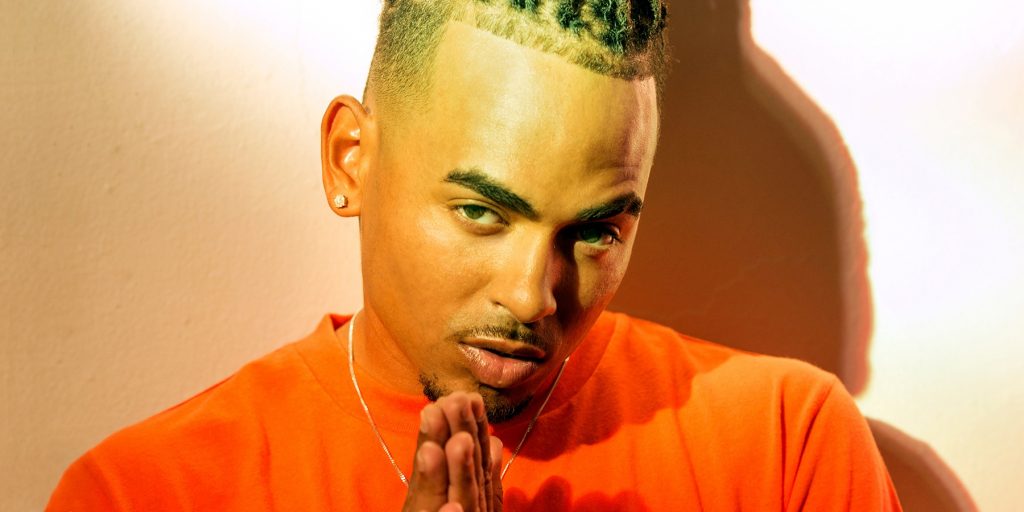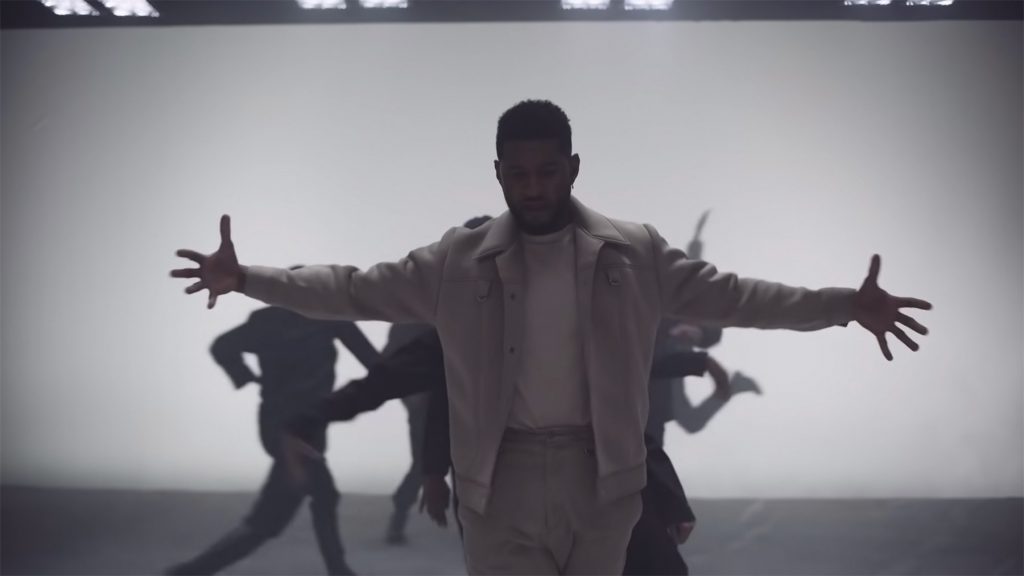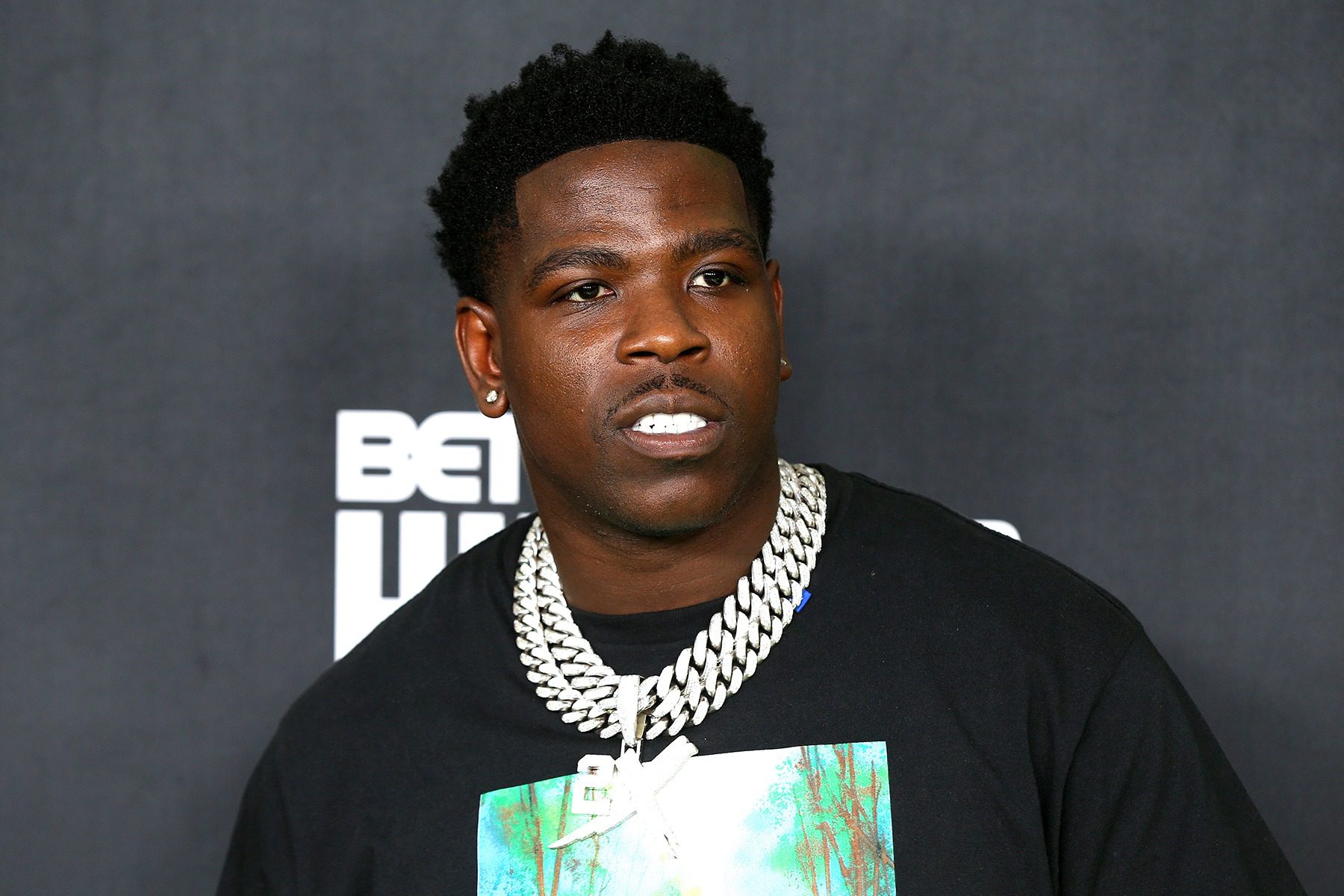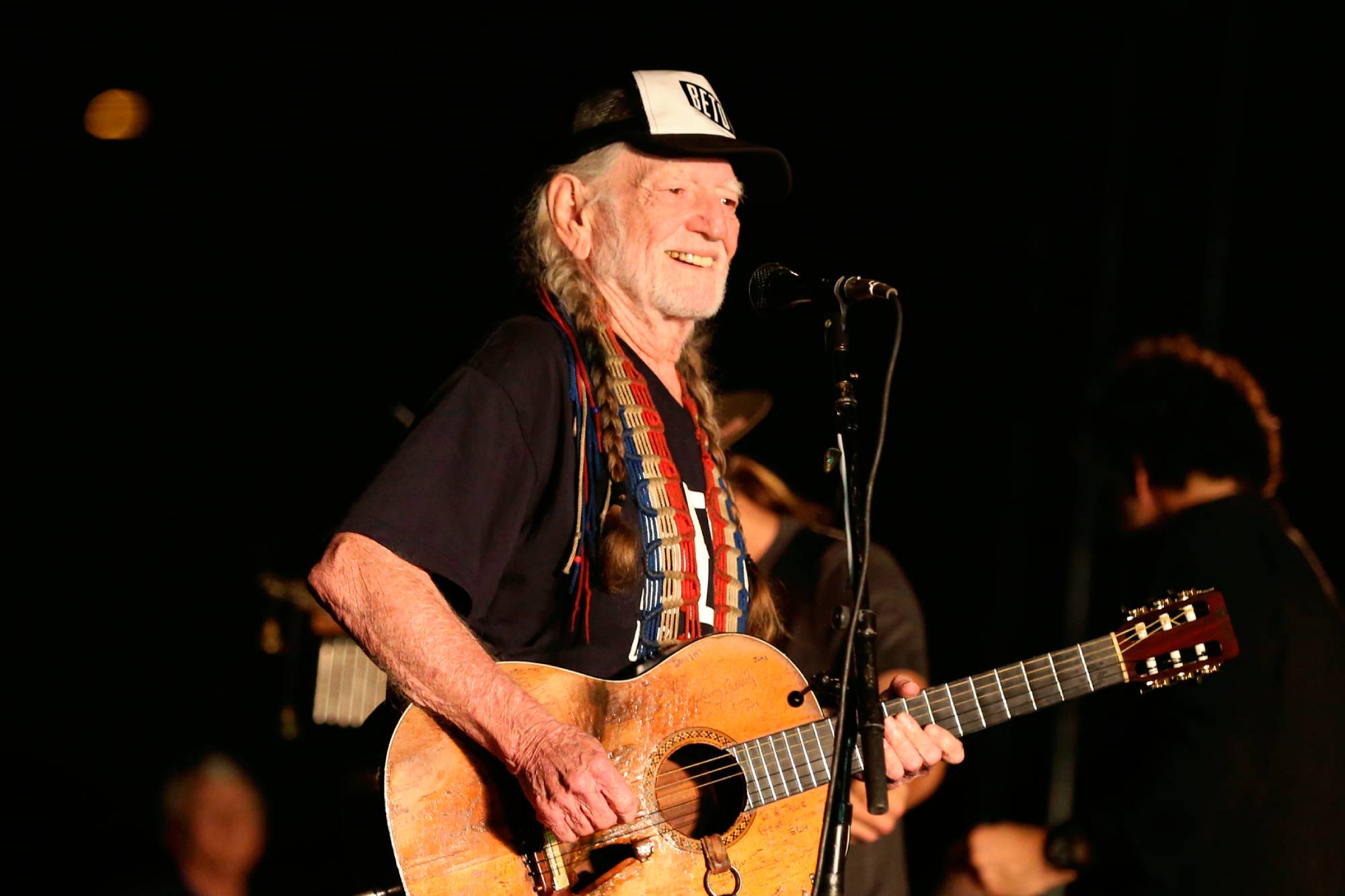
Ozuna Is Here to Represent
Photograph by Gio Alma
Ozuna Is Here
to Represent
Ozuna talks new album ENOC, shaping the future of reggaeton
One August afternoon, several months into the deadliest pandemic of the century, Ozuna is striving for normalcy. Wearing a blue Lakers sweater, sneakers, long shorts, and a watch that looks more expensive than his Miami mansion, he readies himself for an impromptu basketball game with a few of his friends. Unlike other cities in the United States and Latin America, the people of South Florida are left to regulate their own personal safety measures during the outbreak. The Puerto Rican-born singer, who had just wrapped his brand new album, ENOC, ties a blue du-rag around his dreadlocks before stepping out.
This story originally ran in IndieLand Colombia on September 7th, 2020. The interview has been translated from Spanish to English and edited for clarity.
“This is very difficult, brother,” the 28-year-old tells IndieLand. “And I guess it’s the same for everybody. I’m out of shows, and you know I’m used to touring.”
blogherads.adq.push(function () {
blogherads
.defineSlot( ‘medrec’, ‘gpt-dsk-tab-latin-article-inbody1-uid0’ )
.setTargeting( ‘pos’, [“mid”,”mid-article”,”btf”,”in-article1″] )
.setSubAdUnitPath(“music//latin//article//inbody1”)
.addSize([[300,250],[2,2],[3,3]])
.setLazyLoadMultiplier(2)
;
});
It’s not easy being Ozuna. Considering the rising global popularity of reggaeton and Latin trap — not to mention hundreds of artists trying to capitalize from such sounds— it’s a considerable challenge to be original in a time when you think you’ve heard it all. Since releasing four albums, several dozen charting hits, and becoming 2019’s most-watched artist on YouTube, Ozuna has developed a work scheme that has led him to become one of the most prolific hitmakers in Spanish-language music. “To maintain this, you really have to be versatile,” he says. “It’s not a matter of releasing everything I record immediately.”
Unlike many other popular artists who found their voices in Auto-Tune, Ozuna’s formula to success means pairing his his God-given melodic ability with a simple, light-hearted romanticism that’s unmatched by his peers. Ozuna’s standout soprano can be heard on some of the most successful songs in reggaeton history, alongside some of the genre’s greatest proponents: Daddy Yankee, Bad Bunny, Cardi B and J Balvin. When I got the call from his manager to shadow him during the 2019 Latin Grammys, I was entering a trendy rooftop club in Shanghai, China, where “Quiero Repetir” — a 2018 collaboration between Ozuna and J Balvin — was blaring from across the dance floor. That Ozuna’s voice resonated nearly 9,000 miles away from Puerto Rico, is a testament to his reach.
Born Juan Carlos Ozuna Rosado in San Juan, Ozuna grew up between two Caribbean cultures. His mother is Puerto Rican, and his father, a Dominican backup dancer for the legendary rapper Vico C, died when he was three. Thanks to his paternal grandmother, who took on the task of raising him, Ozuna grew up away from the dangerous trappings of Puerto Rico’s street gangs. “My grandmother always taught me to work and to understand that you have to work hard for yourself because no one else is going to do it for you,” he says. “So I always focused on that. That was the environment I grew up in: work and family.”
Juan Carlos began his musical journey as a child, by singing in youth groups modeled after the Backstreet Boys. “They were all white and I was the only black kid in the choir,” he recalls. He eventually decided to undertake music on his own; for his first singing contest, he performed the song “Color Esperanza” by Diego Torres. “At that moment, boom! I truly learned what singing was,” he says. “That’s where I connected and started my entire development as an artist. That song was very important to me.”
blogherads.adq.push(function () {
blogherads
.defineSlot( ‘medrec’, ‘gpt-dsk-tab-latin-article-inbody2-uid1’ )
.setTargeting( ‘pos’, [“mid”,”mid-article2″,”btf”,”in-article2″,”mid-article”] )
.setSubAdUnitPath(“music//latin//article//inbody2”)
.addSize([[300,250],[300,251],[2,4],[4,2]])
;
});

Photograph by Gio Alma. Styling by The Brand by Brandon Vega. Makeup by Pablo Rivera
Meanwhile, at home, he had tapes by local MCs like Baby Rasta y Gringo, Daddy Yankee, Hector El Father and Tito El Bambino on constant rotation. “My grandparents gave me a Walkman,” recounts Ozuna. “I went crazy with my Baby Rasta y Gringo cassette. I remember when it was stolen from me, that was very frustrating! Ever since I was born, everything in my life was reggaeton.”
A blend of reggae and rap en español, reggaeton emerged as a countercultural response to segregation and government neglect on the island during the Nineties. “I grew up in that environment too,” says Ozuna. “[But] what I liked about Wisin y Yandel was… Though they were also street, they started a path for romantic reggaeton.”
After having long been relegated to the domain of “street culture,” reggaeton gradually became a genre that the Latin recording industry used to popularize a sound that could work anywhere in the world. Like salsa in 1970s New York, the genre evolved from the street to the clubs, and would eventually penetrate American popular culture throughout the 2010s, transcending all language barriers; notable examples include Don Omar’s “Danza Kuduro” and Daddy Yankee and Luis Fonsi’s “Despacito.”
With the pandemic raging on, and a sudden boon of free time on his hands, Ozuna finally got the chance to sit down and think about where he’d take reggaeton next. “I’m at my best creative moment,” he says. “We’ve learned, we’ve experienced. I’m just going straight to what I really want to do.” The followup to his ambitious 2019 album, Nibiru, ENOC is an album that revives the classic style of reggaeton, and pairs it with piano melodies, guitar arrangements and collaborations with artists from both Latin and Anglo worlds — as is the case in “Del Mar,” a beach bum love song featuring Sia and Doja Cat singing in Spanish. Latin trap and hip-hop come together harmoniously with native Caribbean rhythms like dembow, dancehall, soca and reggaeton.

Courtesy of Ozuna
The album was recorded intermittently throughout the pandemic, between Ozuna’s Miami home and La Base, Wisin’s Studio in Cayey, Puerto Rico. Guest artists recorded remotely. “When I called Doja Cat and Sia, [recording] went really fast,” says Ozuna. “Also with Daddy Yankee, everything took no more than 24 hours. I feel it was a very organic thing, something God wanted to happen.”
blogherads.adq.push(function () {
blogherads
.defineSlot( ‘medrec’, ‘gpt-dsk-tab-inbodyX-uid2’ )
.setTargeting( ‘pos’, [“mid”,”mid-articleX”,”in-articleX”,”mid-article”] )
.setSubAdUnitPath(“music//article//inbodyX”)
.addSize([[300,250],[300,251],[3,3],[620,350]])
.setLazyLoadMultiplier(2)
;
});
“Enemigos Ocultos,” or “Hidden Enemies,” is a near eight-minute gangsta rap marathon, featuring Arcángel and Wisin, Myke Towers, Cosculluela and Juanka — which immediately evokes one of Wu-Tang Clan or La Coka Nostra’s classic songs. It serves as a mission statement for Puerto Rican artists in the genre: there’s no place for artists who don’t live up to their verses. “I’ve defeated them in all rounds! You’re not rude, all you are is a Boy Scout!” Wisin spits, in one of the most scorching disses in recent years. “I bought a plane because I wanted to fly,” Ozuna says, firing verse after verse like ammo from a machine gun. He doesn’t hold back in his concise, belligerent rhymes, but in the romantic ballad, “Duele Querer,” the singer finds his comfort zone behind the piano; and in “Caramelo,” an acoustic guitar.
“[Ozuna] gave melody to trap in Spanish since he started with ‘La Ocasión,’” says J Balvin, who features in the ENOC cut “Una Locura” with Chencho Corleone of Plan B fame. “He gave it a unique color. His tone of voice and romantic themes resonated with the audience and made a difference. Besides, he is a great live performer, who transmits and proves that he enjoys what he does. He knows what he’s doing.”
From the moment you wrote your first song, were you clear about what you wanted to do with your music career?
I’ve written songs and poems ever since I was a child. It’s hard to have clarity when you’re so young. But what I can say is that things come when you least expect them. Initially, I took up music as a hobby — I had a job, children and a family. I had to work and make ends meet at the same time. You can’t live on the dream alone. But when I left work, I’d go straight to my studio to work on my music.
What do you think was the defining moment for reggaeton’s globalization?
Oh god, you’re gonna get me in trouble! For me, it became global when we came out, those of the new generation; Bad Bunny, Anuel, J Balvin, and me. Daddy Yankee planted the foundations, but it was when our new generations came out that we spread it all over the world. Before 2010, we traveled to Latin America and elsewhere, but it was not what it is today. Today, we go to Europe and do massive festivals and shows. Before, for you to be able to do a massive show, it was very difficult. Maybe Romeo Santos could do it. But reggaeton concerts weren’t as massive as they are now.
blogherads.adq.push(function () {
blogherads
.defineSlot( ‘medrec’, ‘gpt-dsk-tab-inbodyX-uid3’ )
.setTargeting( ‘pos’, [“mid”,”mid-articleX”,”in-articleX”,”mid-article”] )
.setSubAdUnitPath(“music//article//inbodyX”)
.addSize([[300,250],[300,251],[3,3],[620,350]])
.setLazyLoadMultiplier(2)
;
});
“Despacito” was a song that brought reggaeton to everyone — although you could say Yankee did it much earlier with “Gasolina.” But nowadays, music gets around faster. I release a song today, and boom! In Egypt, or Israel, they are already listening to it. It should also be noted that many people [in the industry] slammed doors on Daddy Yankee, Wisin y Yandel and Don Omar. It took a lot of work for them to open [those doors].
Do you feel that you’re reaping the fruits of their labor?
We are reaping the fruits. They had to fight. In Puerto Rico, they tried to ban reggaeton when it first came out. But little by little, it became popular, and to this day, it continues to grow. I don’t think we’ve hit the peak, because we’re still growing. The genre is at its best. There used to be only five artists, and now there are thousands. Every day you hear a new thing. Some leaders chart the way, but new potential will continue to grow.

Photograph by Gio Alma. Styling by The Brand by Brandon Vega. Makeup by Pablo Rivera
An often overlooked influence on reggaeton is that of the producers. How do you choose a producer and how are you sure it’s the sound you’re looking for at some point?
I usually work with the same producers, unless it’s a song for the Anglo market. Anyway, my producers are mostly American; DJ Snake, Tainy, Chris Jeday, Gaby Music. I almost always work with them. I think the reggaeton industry is a very closed circle in terms of that aspect. Of course, there are always new producers, but in my position I want to record with the very best, [because] I know I’m gonna be pleased with the result. When a good new producer arrives with good ideas, a good job, and a good proposal, you have to take it into account as well.
You’re in a competitive environment where new songs and artists are constantly being released. What is your strategy to stay innovative?
It’s a talent that I’ve acquired with work. I go to the studio with a good instrumental [track], and I already have a theme and rhythm of how to work a song. And that only happens with time and experience. Night after night inventing, trying to do this and that. I call it my turbine — I’ll turn it on and that’s it. We know where we’re going. Some new talents believe that they’ll become an artist in a day. That’s not true. This is a super long process. I keep learning more and more each day.
blogherads.adq.push(function () {
blogherads
.defineSlot( ‘medrec’, ‘gpt-dsk-tab-inbodyX-uid4’ )
.setTargeting( ‘pos’, [“mid”,”mid-articleX”,”in-articleX”,”mid-article”] )
.setSubAdUnitPath(“music//article//inbodyX”)
.addSize([[300,250],[300,251],[3,3],[620,350]])
.setLazyLoadMultiplier(2)
;
});
How do you feel about the fact that reggaeton has dominated music in Spanish — especially pop — for a while now?
It’s good, because it shows that we urban music artists are leaders. We make music that people from other genres would like to do. Though they used to make [rock music], Reik, whom I like, are doing good in reggaeton. I think they sing even better than many reggaeton artists! It suits them.
Do you consider Puerto Rico’s urban music different from that of the rest of Latin America?
Of course, it’s extremely different. There’s some controversy around where was it born, or where the genre comes from… But to me, reggaeton is from Puerto Rico. The way we talk is like singing a reggaeton song. Tell me where the three greatest reggaeton artists are from… And that’s not belittling the work of others, but in Puerto Rico, there’s a lot of musical fever for the genre. If you listen to my song “Gistro Amarillo,” it’s a song that can only be made by Puerto Ricans — because of the wording, the jargon, and the whole theme. It’s purely our culture.
There is something that sets Puerto Rican artists apart. It’s a lyrical, vocal, and rapping ability that you can hardly find in other parts of Latin America…
That’s our ability: Versatility.

Courtesy of Ozuna
With so much competition in the market today, where do you think the success of a song lies?
Well, speaking specifically of reggaeton, there are many success factors. The music and instrumentation, the lyrics, the artist who sings it, and how they promote the song. Some songs are an instant hit, but others need a lot of work to reach the public’s ear. When I started, there was only one way to do it and it was through digital platforms like Spotify and Apple Music. They were [growing] around the same time artists like Bad Bunny and I were making music. Nowadays, there are multiple ways to do marketing.
You grew up on urban music. Have you ever considered that the genre had a misogynistic character?
Today, there is no room to offend women in music in general. It’s a different time. Maybe I see it in other songs that aren’t mine, but I’m really careful about that. I mind my own business. I’m me. I know the urban genre is huge, and there’s a lot to take in, but I’m taking care of my part. I don’t agree with talking bad about women. There are some playful, spicy things that we all like, but in a matter of tarnishing women, that’s not allowed on my record label. In fact, in the most successful songs I’ve ever had, women were my inspiration.
blogherads.adq.push(function () {
blogherads
.defineSlot( ‘medrec’, ‘gpt-dsk-tab-inbodyX-uid5’ )
.setTargeting( ‘pos’, [“mid”,”mid-articleX”,”in-articleX”,”mid-article”] )
.setSubAdUnitPath(“music//article//inbodyX”)
.addSize([[300,250],[300,251],[3,3],[620,350]])
.setLazyLoadMultiplier(2)
;
});
Taking into account the global popularity of the genre, what’s your strategy to reach new audiences with your music?
Clean lyrics that reach all hearts. Situations. Simplicity is what people like these days. Sometimes we complicate ourselves by looking for things and exaggerating. It must sound differently. I can’t tell you “this is the trick,” but kids, women, and older people like it. And I think that’s the result of how we do things, from the heart. The team we have is, as we say in Puerto Rico, a beast. We work as a team and add a lot of heart. Not do things to upstage others, or for money. We work hard to increase our revenue, but we do it from our heart to the public. I feel like that’s the most important thing.
Why do you think reggaeton is perhaps having a greater impact in the United States than in Latin America?
Latinos are everywhere in the world. There haven’t been as many Latinos in the United States before as there are now. Besides, by mixing Latinos with Americans, and showing and teaching our music to them, and in turn their music to us, everything has been mixed. That didn’t happen before. Current phones, technology, iPads, all those things have made the process much easier for music to reach everyone. Besides, Latin music has a lot to do with dancing, and our reggaeton is danced by being very close to the other person. It’s something sensual that is sought all over the world, and I think it will be like that for a long time.
In these current circumstances, have you been able to analyze the pros and cons of being away from your family and on tour all the time?
I have mixed feelings. On one hand, touring is difficult, but the other, it means that things are going well. It’s hard for the family and for children… That moment when you have to stop being with them. They know I’m working. It’s not that I don’t get sad, but I call them all the time to keep tabs on them.
What do you think about those who want to decouple the “urbano” music label from reggaeton?
You can put any label on it and it’s always going to be the same. I don’t have a problem. I don’t know what to tell you about that because, those of “urban” music, we have always been artists and our music is as pop as any other. I prefer that our music is called reggaeton, because urban can be anything. But reggaeton can’t be done by anyone, not the way we do it.
blogherads.adq.push(function () {
blogherads
.defineSlot( ‘medrec’, ‘gpt-dsk-tab-inbodyX-uid6’ )
.setTargeting( ‘pos’, [“mid”,”mid-articleX”,”in-articleX”,”mid-article”] )
.setSubAdUnitPath(“music//article//inbodyX”)
.addSize([[300,250],[300,251],[3,3],[620,350]])
.setLazyLoadMultiplier(2)
;
});

Photograph by Gio Alma. Styling by The Brand by Brandon Vega. Makeup by Pablo Rivera
How do you handle the pressure that every song should be a huge hit in the environment you’re in?
I don’t feel that pressure. I’ve already made over 120 hits in general. More than 110 Multi-Platinum songs, more than 110 songs at the top of the radio chartings. Nowadays, I think it’s done for love and desire. Sure, I still have that desire of being big, but if I insist on thinking that every song must be a success, I’m going to fail with everything that I release. I focus on making good music, getting together with good composers, with people who always add up and bring good ideas. As many people might think, I don’t do everything on my own, we have a team. It’s musical fever. Every day you have to be able to make something new, and I think we all have the same hunger that we had when we started and wanted to grow in this industry.
How do you measure your success? What makes you feel happy and successful?
The story I’m writing on this earth. Four Guinness World Records. Eleven Billboard Awards. More than 20 award nominations. You interviewing me for IndieLand! All those things please me, but what I can be most pleased and grateful for is seeing a happy audience singing my songs. That’s the real success.
What are your top three songs in reggaeton history?
“Gasolina,” Daddy Yankee, “Dale Don Dale,” Don Omar, and “Mayor Que Yo,” by Luny Tunes.
Considering the difficult situation that the music industry is going through due to a lack of concerts, how are you preparing for that? When do you plan on returning to the stage? And if that’s delayed, what’s your plan to remain relevant to the fans?
Music speaks for itself. There’s going to be a way to connect, I don’t know what it is, but a professional way of doing these shows will come. I think this is going to take a while. Going back to normal doesn’t look like it’s gonna happen next month, but we’re ready. I know God is working for that and we’re going to be able to hang out with our fans again and do what we did before. Right now we’re creating and continuing to grow as artists. As soon as the shows open, trust me, the audience will be eager to see us more than ever.




